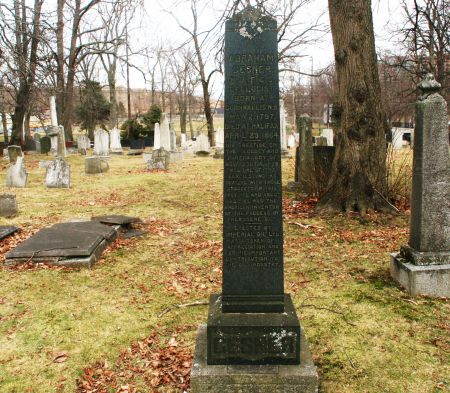It is difficult to pinpoint exactly what it is about Dr. Grant Wach's presentation, titled “Burning Rocks: The History of the Petroleum Industry in Canada and the Maritimes”, that lingers awkwardly in the stuffy air of the basement auditorium of the Museum of Natural History in Halifax. It is clear, from the outset, that Wach knows his topic inside and out. From the early days of Abraham Gesner, circa 1850s, who found the burning rocks in question in Albert County, New Brunswick, all the way to “Deep Panuke”, the latest offshore gas platform to grace the coast of Nova Scotia, Wach paints an historical portrait rich in petroleum lore.
To be sure, Wach himself is an oil and gas man, the likes of which knows few counterparts in this neck of the woods. His biography runs like a who's who of gushers and big finds the world over. The tar sands? The man was there with Syncrude in 1979, before most people knew what bitumen was. He's explored Nigeria, the Far East, and the Americas. He specializes in deepwater depositional systems, and previously worked for Texaco Upstream Technology, and Exxon's Production Research Company. He's now professor of petroleum geoscience at Dalhousie University.
The problem with Wach's talk is that it occupies that thin stream of the petroleum conversation in which oil and gas, which have undeniably altered the course of human development in unfathomable ways, are only good. His presentation itself is not so much a re-writing of history, as it is a selective account of Canada's relationship with oil and gas. It is a love affair, no more, no less.
Oil and gas companies are portrayed as blundering innocents, who, if only they could be kept in check by government regulations, would fill the public coffers, and would go about their business responsibly. There are more than a few environmentally concerned individuals in the crowd, and it is to government inefficiency that Wach suggests they direct their desires for answers.
It is here that Wach's presentation seems to derail itself in a significant way, for there is no peering behind the curtain on his part, to where suitcases of money are inevitably exchanged between oil barons and bureaucrats. Nova Scotia has a rich history of this, and during question period Alan Ruffman, retired ocean floor mapper, also in attendance on this night, recounts one particular story where a member of Parliament was bought off with so much money he had to bring in staffers to help him count it.
It falls to “public education,” according to Wach, to ensure that hydraulic fracturing, for example, is properly monitored and executed in Lake Ainslie, Cape Breton. Where the public is supposed to educate itself, when the provincial government has no regulations on hydraulic fracturing, is not opined by Wach. What the public is supposed to do with said education, when the Dexter government has dismantled the public consultation process, is again not mentioned.
Wach's talk ends with "Deep Panuke." Nova Scotia is set in a matter of months to see this major offshore drilling project go online off her coastline. Nova Scotia, in the midst of a massive undertaking, trying to wean herself off of coal-fired generators through the implementation of a “Renewable Electricity Plan,” is not even set up to utilize the gas that Deep Panuke is slated to produce. It will be most likely for American consumption. While Wach shows the crowd the commemorative plate from the Hibernia strike he has borrowed from a friend, it is again Ruffman who tries to inject some semblance of balance into the evening.
“We're in a position, where we're now talking about building a six billion dollar Lower Churchill/Muskrat Falls plant, and Nova Scotia's going to buy a big chunk of that...when there's enough gas stranded offshore on the Grand Banks to bring it to the coast of Newfoundland and burn it 24 hours a day, 365 days a year, to make all the electricity that Newfoundland would ever need for the next 35 years,” says Ruffman.
For Ruffman, it is about using the resources at hand, in-house. To this, Wach interjects.
“I want people to remember how long oil and gas exploration has been going on and how successful it has been,” says Wach. “We have to ensure proper regulations are in place, but it's foolish to bring in moratoriums and shut down any source of economic development we have that's going to help things out. We have an insatiable demand for energy, and we need every aspect we can.”
It is industry apology. But it is more: it is industry history, where old Abraham Gesner, six feet under for over a century, harmlessly collecting Albertite for heat, is no more or less a frightening possibility than the Gulf of Mexico, or the Nigerian Delta, or the Exxon Valdez, or Lake Ainslie. And if these disasters happen, then it is government lack of regulation and an uneducated public who are to blame. Oil and gas companies are just feeding our insatiable demand.



